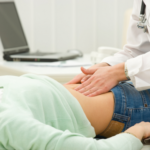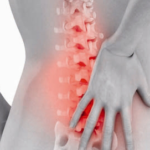Signs and treatment of inguinal-scrotal hernia in men
Inguinal scrotal hernia is a surgical pathology, which is defined as the protrusion of a part of the internal organs of the abdominal cavity into the scrotum as a result of a number of provoking factors. There is no specific cause of occurrence, the disease always develops under the influence of several factors at once.
It is believed that an inguinal hernia is the last stage in the development of an oblique inguinal hernia.
Inguinal scrotal hernia in men usually develops upon reaching the age of 50, but this does not exclude the possibility of the formation of an ailment in young people. Based on the anatomical features, girls are not susceptible to this pathology.
The main factors in the development of this type of hernia is a strong increase in intra-abdominal pressure, due to which the organs, under the influence of pressure, migrate to an area of \u200b\u200bless resistance, which is the groin and scrotum. As a rule, elements of the gastrointestinal tract fall into the hernial sac: parts of the small and large intestine, a large or small omentum.
There are two main types: congenital and acquired hernia of the scrotum. The specificity of the first option is determined by the anatomical and physiological features of the development of the infant during fetal development.
The boy's testicles are not immediately in the scrotum cavity. The child's testicles begin to form and fall only from the third month of life in the mother's womb. So, as the monthly growth, the testicles gradually descend into the scrotum, and only by the end of 7-8 months do they reach their final destination. By the time your baby is born, the testicles are already in the scrotum.
Normally, after the descent of the testicles, the channel through which the testicles went closes. However, as a result of failures in embryogenesis or various genetic defects, such overgrowth may not occur. In the event that the organs "followed" the reproductive organs of the boy, a hernia is formed in newborn boys.
Causes of an acquired hernia
There are many factors that, to one degree or another, influence the development of hernia pathology.
These include:
- Genetic predisposition to weakness of the ligaments and muscles of the hip joint.
- Uncontrollable and intense physical exertion, such as carrying heavy weights. Most often, people whose lives are connected with constant physical exertion suffer: athletes, builders, loaders.
- The presence of excess weight, in which the adipose tissue grows large and small omentum . They push the organs out, forcing them into the groin area.
- Sedentary lifestyle . Muscles without minimal physical exertion are weakened, and no longer perform the function of a muscular corset, which maintains the tone of internal organs.
- Diseases that are associated with constant coughing, regular constipation, sneezing . All these are strong factors that increase pressure inside the abdominal cavity.
Clinical picture
Symptoms of inguinal-scrotal hernia are varied. In many ways, the specificity of the signs is determined by the organs that are in the hernial sac. However, bulging is always accompanied by pain. The pain is caused by constant irritation of the nerve endings, where they are already full in the pelvic area.
Pain sensations are of the following nature:
- increases with physical exertion, while at rest, pain may not be;
- the intensity of discomfort increases when you press on the hernia itself;
- pain at first is easily removed with painkillers.
Another notable symptom is the formation of the protrusion itself. An external defect on the skin is easily noticed by the patient. There is asymmetry of the skin. The scrotum itself also greatly increases in size. Its volume sometimes reaches the size of a ripe watermelon.
In severe cases, the hernial sac may contain the entire intestinal tract.
Also for a groin hernia, the following symptoms are typical:
- frequent bloating, flatulence;
- nausea, loss of appetite;
- weakness, frequent malaise;
- with inflammatory processes, local lymph nodes increase;
- increased body temperature;
- discomfort.
The scrotum is part of the genitourinary system, so the following symptoms are recorded:
- erectile dysfunction;
- decreased libido;
- difficulty urinating.
With various complications, the following symptoms are superimposed:
- violation of the stool: feces do not pass through the strangulated intestine;
- lack of gas emission;
- vomiting with an admixture of intestinal contents.
Strangulated inguinal scrotal hernia
This condition is considered a formidable complication of a stable course of the disease. Infringement occurs in both adults and children. Pinching usually means a sudden squeezing of the organs clamped in the hernial sac, followed by a stop in their functional activity. With the development of complications, local blood flow is disturbed.
The hernial ring is compressed, the vessels do not supply blood to the organs, necrosis and peritonitis often develop. The main syndrome that appears when pinched is the syndrome of acute intestinal obstruction. This condition must be treated exclusively surgically.
Signs of a strangulated hernia in children:
- Children tend to become restless, irritable, assume unnatural positions, may cry, and almost always refuse to eat. Older children usually themselves indicate the localization of pain.
- At first, the body temperature is within the normal range, but as the complication develops, the temperature rises sharply.
- On examination, the hernia in boys becomes elastic, with severe pain.
Diagnostics
Diagnostic measures consist in three stages of the study of the patient:
- General inspection. Here the doctor assesses the general condition of the patient, examines his heredity, consciousness, collects an anamnesis of life.
- Objective examination. In this case, the specialist studies everything related to the hernia itself: its size, degree of pain, stage of the disease, and the likelihood of complications. In diagnosis, the symptom of a cough shock is of great importance, when the doctor puts his hand on the hernia and asks the patient to cough. So there is a differential diagnosis between the restrained and not restrained hernia.
- Instrumental research methods:
- Ultrasound of the abdominal cavity, scrotum;
- herniography - a special x-ray examination of the protrusion;
- irrigography - the study consists in an x-ray examination of the colon, namely: its patency is studied;
Such laboratory indicators as a complete blood count, biochemical analysis of blood and urine take a special place in the diagnosis of various complications. With a stable course of the disease, the laboratory is uninformative.
Treatment
Therapy of the disease is carried out both conservatively and surgically. The first option is indicated in cases where the operation is contraindicated: the patient's advanced age, serious pathologies of the internal organs.
A conservative treatment option involves wearing a special bandage that allows you to keep local muscles in good shape and prevents the development of complications. A medical bandage for an inguinal scrotal hernia is most often represented by elastic swimming trunks that are in close contact with the body. They do not allow internal organs to move.
Also, this type of treatment involves taking a number of drugs: anti-inflammatory drugs, muscle relaxants, painkillers.
However, the most effective treatment for a hernia is surgery. It should be remembered that treatment without surgery will not bring such effectiveness as with it. Any complication is a direct indication for the operation. Operational procedures are performed under local anesthesia. The intervention itself does not take much time.
During the operation, an incision is made, as a result of which the surgeon gains access to the hernial sac. The specialist assesses the condition of the internal organs, which are then reduced. After that, the inguinal canal plasty procedure is performed in order to prevent complications after the operation of the inguinal scrotal hernia.
Consequences
Common consequences are:
- tissue necrosis;
- inflammation of the abdominal cavity - peritonitis;
- appendicitis.










